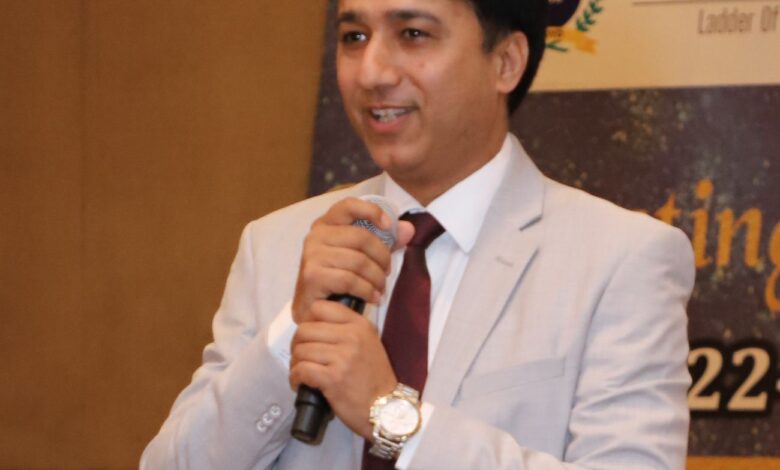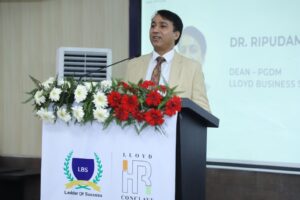From Small Village to Academic Leadership: The Inspiring Journey of Lloyd Business School’s New Dean

Bringing over two decades of experience in academia and brand management, Ripudaman Gaur, the new Dean of Lloyd Business School is set to transform the institution. Their approach to engaging diverse audiences and adapting to technological and cultural changes highlights a forward-thinking vision for the future of education
Q1-Can you share some insights into your journey and how you transitioned into your current role as Professor & Dean at Lloyd Business School?
I grew up in a small village of Aligarh (UP) where opportunities were limited and resources were scarce but vales were strong. Despite these challenges, I was fortunate to have a family that valued education and encouraged me to pursue my dreams. My early years were marked by a strong sense of curiosity and a drive to learn, which were fueled by the guidance of my father who was a great teacher.
As I advanced in my career, I sought roles that allowed me to blend my academic interests with practical leadership. My work as Chairperson (Out-Reach), Dean (DSW) in my previous institutions, provided me with valuable insights into institutional dynamics and the transformative power of education. Through these roles, I developed a strategic vision for academic leadership and began to make meaningful contributions to the institutions I was part of.
Becoming the Dean of Lloyd Business School is both a tremendous honor and a testament to the journey that has shaped me. My goal in this role is to bring a fresh perspective, grounded in the values and experiences that have defined my career. I am committed to leveraging my background to drive innovation, foster collaboration, and ensure that Lloyd Business School continues to thrive as a leading institution.
Q2-With over 21 years of experience in academia and brand building, what are some key lessons you’ve learned about personal and institutional branding?
With over 21 years of experience in academia and brand building, I’ve had the privilege of witnessing and shaping the evolution of both personal and institutional brands. Here are some key lessons I’ve learned along the way:
▪ Authenticity Builds Trust: At the heart of any successful brand is authenticity. Consistency is Key: Consistency across all touchpoints is essential for a strong brand. This means having a unified message and visual identity whether in your marketing materials, online presence, or public engagements
▪ Engage and Interact: Active engagement with your audience can significantly enhance your brand.
▪ Adapt to Change: Branding is an evolving process. Successful brands are those that can adapt to changing trends and needs while staying true to their core values.
▪ Highlight Success Stories: Sharing success stories and achievements can amplify your brand’s impact.
▪ Commit to Quality: A commitment to excellence is fundamental to building a strong brand.
▪ Foster Relationships: Building and nurturing relationships is crucial for effective branding.
Q3- You’ve delivered numerous talks and seminars Nationally & Internationally. How do you tailor your content to resonate with diverse audiences across different cultures and regions?
Delivering talks and seminars internationally has been a rewarding experience, and tailoring content to resonate with diverse audiences is both an art and a science. Here are some key strategies I use to ensure my content connects with varied cultural and regional audiences:
▪ Understand the Audience: Before crafting my presentation, I invest time in researching and understanding the audience’s cultural context, interests, and expectations. Adapt Language and Examples: I tailor my language to suit the cultural and regional preferences of the audience.
▪ Be Culturally Sensitive: Cultural sensitivity is crucial in global presentations. I make an effort to respect and acknowledge cultural norms and values.
▪ Leverage Visuals and Stories: Visuals and stories are universal tools that can bridge cultural gaps
▪ Encourage Interaction: Engaging the audience through interactive elements such as Q&A sessions, polls, and discussions helps to bridge cultural differences.
▪ Seek Local Insights: Whenever possible, I collaborate with local experts or colleagues who can provide valuable insights into the cultural and regional nuances.
▪ Be Flexible and Responsive: Finally, flexibility is key. I remain open to adjusting my presentation based on the audience’s reactions and feedback.
Q4- Your sessions are known for their creativity and unique delivery style. What strategies do you use to engage and motivate your audience effectively?
My approach to engaging and motivating audiences during my sessions involves a combination of creativity, interactive techniques, and a deep understanding of audience dynamics. Here are some strategies I use to ensure that my sessions are both captivating and impactful:
▪ Start with a Strong Opening: I begin my sessions with a compelling story, intriguing question, or impactful quote that captures attention from the very start.
▪ Incorporate Interactive Elements: Engagement is significantly enhanced through interactive elements like Stories,
▪ Encourage Participation: I design activities that promote audience participation, such as group discussions, brainstorming sessions, and hands-on exercises.
▪ Employ Storytelling Techniques: Storytelling is a powerful tool for making content resonate.
▪ Customize Content to Audience Needs: Understanding the specific interests and needs of the audience allows me to tailor the content accordingly.
▪ Inject Energy and Enthusiasm: My delivery style is characterized by enthusiasm and energy.
Q5-In your opinion, what are the most significant challenges that today’s youth and professionals are facing, and how can personal branding help address these challenges?
In today’s rapidly evolving world, both youth and professionals face a range of significant challenge. The job market is increasingly competitive, with rapid technological advancements and shifting industry demands. Young professionals often struggle to differentiate themselves and secure opportunities. Personal branding can be a game-changer here. By building a strong personal brand, individuals can highlight their unique skills, experiences, and value propositions. A well-crafted personal brand helps them stand out to potential employers and showcases their strengths in a crowded market. The search for meaningful work and career direction can be daunting. Personal branding encourages individuals to reflect on their passions, values, and goals. By aligning their personal brand with their core values and desired career path, they can more effectively pursue opportunities that resonate with their sense of purpose and direction.
Q-6 You’ve spoken extensively on topics like digital literacy and stress management. How do you see these areas evolving in the coming years, and what advice would you give for adapting to these changes?
“Digital literacy and stress management are both critical areas that are evolving rapidly, influenced by technological advancements and shifting societal norms. Here’s how I see these areas evolving in the coming years, along with advice for adapting to these changes:
Digital Literacy:-As technology continues to advance, digital literacy will encompass more than just basic computer skills. It will increasingly include proficiency with emerging technologies such as artificial intelligence, machine learning, and blockchain. Understanding how these technologies work and how they impact various industries will become essential. To adapt, individuals should engage in continuous learning, seek out training on new technologies, and stay informed about industry trends. Digital tools and platforms are becoming more integrated into daily life, from remote work to virtual collaboration and online education. With growing concerns about data breaches and cyber threats, digital literacy will need to include a strong understanding of data privacy and cybersecurity.
Stress Management: There is a growing recognition of the importance of mental health and well-being, which is likely to continue expanding. Stress management will increasingly involve holistic approaches that integrate mental, emotional, and physical health. To adapt, individuals should adopt a comprehensive approach to stress management, incorporating practices such as mindfulness, physical exercise, and seeking professional support when needed.
Q7-Can you provide an example of a particularly memorable or impactful session you’ve conducted, and what made it stand out?
One of the most memorable and impactful sessions I conducted recently was a MDP on “Management Lessons from Indian Knowledge System”. This session stood out because audience were sensitized about the contribution of India in the field of Management and Leadership. Some of the audience requested to conduct this session repetitively.
Q8-What advice would you offer to individuals and organizations looking to enhance their personal and institutional brands in the current competitive environment?
In today’s competitive environment, enhancing personal and institutional brands requires a strategic and nuanced approach. Here’s some advice for individuals and organizations looking to elevate their brands effectively:
For Individuals, I will advise to clearly articulate what sets you apart from others in your field. Identify your strengths, skills, and experiences that uniquely qualify you. Ensure that your personal brand consistently communicates this value proposition across your resume, online profiles, and during networking opportunities. Use social media platforms to build and maintain your professional image. Cultivate and maintain meaningful professional relationships.
For Organizations, Ensure that your institutional brand is built on a clear and compelling mission and vision. Communicate these consistently through all channels, including your website, marketing materials, and organizational communications. Share stories that reflect your organizational values, successes, and impact. Enhance your brand by delivering exceptional experiences to your customers and stakeholders. Be proactive in responding to market trends and changes. Stay informed about industry developments and adapt your strategies accordingly. Your employees are your brand ambassadors. Invest in their development, align them with your brand values, and encourage them to share their positive experiences.






